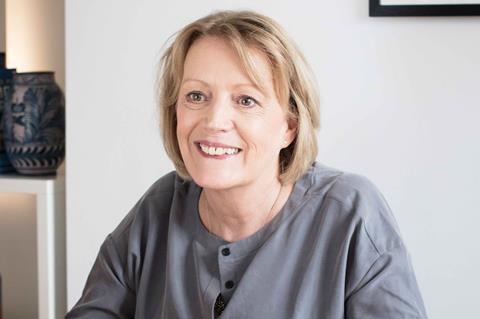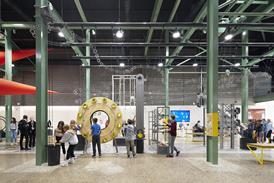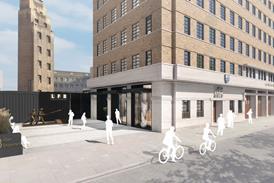In the midst of relentless deadlines, seasonal stress, and the demands of daily life, Louise Rodgers shares why listening to your mind and body is vital. By acknowledging our limits and prioritising rest, we can embrace the wisdom in pausing to reset, recharge, and approach the new year with clarity and energy

In the Cold War film, Bridge of Spies, the excellent Mark Rylance plays a man accused of being a spy and threatened with the death penalty. Faced with his imperturbable response to this, his lawyer (played by Tom Hanks) comments, “You don’t seem alarmed.”
“Would it help?” asks Rylance. It’s a line repeated a few times throughout the film, when circumstances are indeed alarming, but Rylance keeps his calm.
I thought about this a couple of weeks ago when Building Design asked if I could write a column looking ahead to 2025, with predictions and perhaps some advice for the year to come.
My first thought was to say no. My Christmas break had almost started a couple of weeks earlier than it was meant to when my elderly father was taken, blue flashing lights and all, to hospital with a life-threatening condition.
And yet here I am. Dad will live to fight another day, and my fear and alarm made not the slightest difference to that.
So, this is a column about not looking too far ahead and making plans and predictions for things that we have little control over. There are times when for any of us, and right now that’s me, this is a pretty pointless activity.
My advice instead is to suspend such thoughts and just try to enjoy the invitation from the darker evenings to hibernate, even just a little. Take the opportunity to slow things down and be in the moment with your life and, if you are lucky to have them around you, the lives of people you love.
We are approaching the solstice, and I believe enough in ‘woo woo’ to think that when the days start to get longer, even by tiny increments, our energy levels will rise with it.
I speak to too many people in my line of work who are feeling they are on a hamster wheel. A client with English as a second language recently described himself as feeling like a ‘rat in a wheel’. He was mixing his metaphors, but either way, he felt trapped.
Someone else I have worked with has just taken two months off for his mental health. Another has seen a doctor about burnout and been prescribed antidepressants. Of course, this can happen at any time of year, but in December it feels almost an inevitable outcome for people who have had a tough, relentless year.
It is wisdom, not weakness, to acknowledge the fact that we have had just about as much as we can take for now and need to rest and recharge before continuing
And if you really can’t get off that hamster wheel for a week or two at Christmas, then I think you have to ask yourself some serious questions about your life.
Especially if you spend that time slumped on the sofa fighting off a cold because your levels of energy and immunity are so low as a result of the battering they took during 2024 that anything else is just too much effort.
How can we stop this happening, to ourselves and to those around us?
One thing we can do is to be more sensitive to the signs of mental and physical exhaustion. Easy to say, less easy to do. A responsible line manager should have done enough courses, or reading, and have sufficient humanity to know how to spot the early signs and do something about it.
This doesn’t negate our individual responsibility to tune into our own sense of personal well-being and act for, and by, ourselves, if that’s what’s needed.
It is wisdom, not weakness, to acknowledge the fact that we have had just about as much as we can take for now and need to rest and recharge before continuing.
I have also spoken to too many people who are stressed about Christmas and end-of-year deadlines. But I do wonder how many of these are ‘actual’ deadlines, and how many of them are arbitrary and more or less irrelevant, because nobody is going to look at anything until mid-January anyway. A few days’ grace until the beginning of the month might actually make for better work, by a brain and a body that is feeling fully rested.
As coaches, we know that we can’t support our clients in the way that they deserve and need to be supported if we have things going on in our own lives which are causing us stress or upset.
It would’ve been unfair for me to turn up at coaching sessions when my dad was sick and do what I need to do as a coach – which is to hold the space, listen, and provide the prompts to enable people to face their own challenges and feel a little better equipped to do so.
I am guided by professional ethics and my understanding of my craft, which tell me that if I am questioning my own well-being, I need to step away from coaching.
In some ways, this makes it much easier to just stop. I do appreciate that for architects and other consultants in the built environment, where the ethics around this may be less clear, the decision can be more difficult.
Which is why I have latched onto the mantra ‘wisdom, not weakness’ and adopted it as my own for the next few weeks. I won’t be making predictions or planning ahead too much. I will just be taking it day by day, tuning into my mind and my body, and listening and acting on what it is telling me.
Postscript
Louise Rodgers is Building Design’s professional coach. A personal and business coach, she co-created and co-delivers Step Up, a leadership development programme for built environment consultants.
Do you have a question for Louise? If so email louise@eidyia.co.uk. She will use the most interesting in her columns but cannot enter into individual correspondence.
















No comments yet